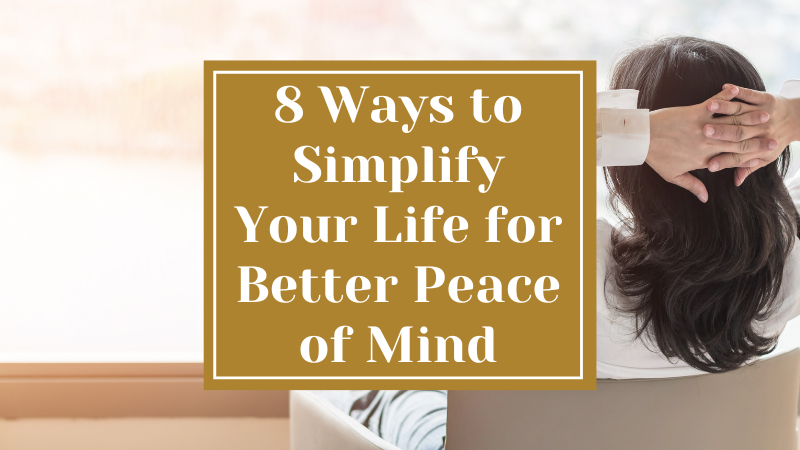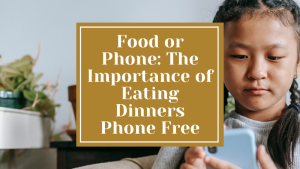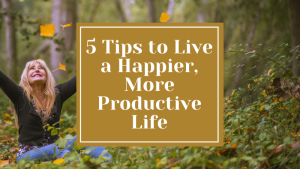There’s been lots of talk lately about editing things out of your life. This could not have come at a more interesting time. For the last three months, I have been in a “simplifying” mode.
Personally, I prefer to think of it as simplifying my life over editing. Editing seems to have a negative and harsh connotation to me. I picture a cutthroat business woman tearing apart a project that I loved while I cry in the background. It makes me feel that I’m cutting things out of my life and losing something I love.
For me, simplifying signifies that I’m making my life easier and simpler, which leads to better peace of mind. I’m not losing out on anything, I’m just making things less cluttered and easier for myself. When I think about simplifying my life, I think about all the things I’m about to gain: being more organized, saving time on cleaning, less cluttered homes, saving money, and a better state of mind.
To simplify, let go of excess, physical or otherwise. This stuff only weighs on your mind and psyche! A good organization and simplifying process will teach you more about yourself than you realize. Dig in and start with small steps. I’ve share a few steps below that may help you on your journey to simplify your life.
How to Simplify Your Life
1. Keep what’s important.
This is different for everyone, only you can decide what is important or not for yourself. This can take some serious soul-searching. However, a good place to start is with all of those items that you haven’t even touched in years and items that you’ve been holding on to, “just in case.”
We’ve all got stuff and still now, 7 years after I started simplifying my life, I am working through the layers of “stuff” I have. It’s still amazing to me how stuff gets in the way. It clutters up our minds and our space. A willingness to part with it, even a little at a time, moves us forward.
2. Don’t “should” yourself.
And, don’t “should” on other people. If you don’t feel a strong conviction to do something, that’s probably a sign that it needs to go. Don’t bog up your mind and home with things you “should” do. Either do those thing, or let them go.
Letting your self constantly think things like, “I should go hang out with that person, but . . .,” or “I should do this project, but . . .,” will only fill up your mind with stress, anxiety, and feelings of letting yourself and others down.
3. White space is ok.
It’s okay to have a few days that you don’t have anything scheduled. Downtime helps you unwind. Giving ourselves time and permission to do nothing is good for our mental health. You don’t have to be on “go-go-go mode” all the time. In fact, to much go-go-go will lead to poor mental health and burnout in many aspects of your life.
4. Say “no” more than you say “yes.”
I know, I know. There’s a lot of people out there who promote that you should try to say “yes” in all aspects of your life. However, I’ve found that many of us have a problem with saying “yes” too much. We agree to help out people when we don’t actually have any time to and allow our own lives to suffer.
Some people recognize easy “yes” people and take advantage of them. Have you ever had a friend who seems like they have no problem with asking for your help on something nearly everyday? But on the rare instances when you ask for help they just can’t be bothered?
If you’re carrying other people’s burden’s and work in sacrifice of your own, then you should say “yes” less. You don’t have to help with everything. Plus, when you are more picky with your “yeses,” they will mean much more. Doing more than you should doesn’t make you nicer, cooler, smarter, or better — it just makes you tired and bitter.
5. Stick to nutrient dense foods.
What does that have to do with simplifying your life? For me, it meant cutting out many snacks and excess foods, spending less on groceries and fast food, and helped me to feel better without having to diet, detox, or workout (two things that I hate).
It meant taking out things that aren’t helping and putting in things that do. Someone suggested to me that I should be eating 80% nutrient-dense foods and 20% of whatever else I wanted.
6. Stop giving into pressure.
Think peer pressure goes away when you’re an adult? Nope. Not only that, but the obligation or personal pressure we put on ourselves to perform, go to things, do things, buy things, eat things, whatever can really weigh us down as well. With social media front and center, it’s easy to feel like we should be doing all the best parts of several different super-mom’s. What we don’t see is that they probably have struggles of their own.
Life is too short to do things on other’s terms — own your own life! Get rid of the things that aren’t taking you higher and focus on the things that are.
7. Ask for help.
Sometimes you need help to take the next step. Whether it’s a coach, friend or loving spouse, everybody needs encouragement and help. Reach out and grab it. There is no shame in asking for help.
8. Evaluate your relationships.
If someone in your life is dragging you down, it might be time to re-evaluate your relationship with that person. Sometimes we hold on to relationships far longer that we should or allow boundaries to be crossed. People change, and sometimes we grow apart. If there’s a person in your life that is constantly bringing you down, taking advantage of you, or that you just don’t enjoy being around anymore, it’s okay to cut them out of your life. It can be hard, but ultimately this is your life and you’re not living it for them.
If you still want to keep a relationship, but you feel as though they’ve crossed important boundaries and aren’t being respectful of your or your time, then you can try to reset healthy boundaries first. For example, I once agreed to baby-sit a friends kids for a couple days so she could go to work when her original form of childcare fell through. She started asking me more and more, and since I hadn’t said no initially, I kept feeling like I needed to keep saying yes. Eventually, she expected me to always watch her kids and got upset at me and tried to guilt trip me if I said that I wasn’t able to sometimes.
I had to have a hard talk with her where I told her that I wasn’t responsible for baby sitting her kids every day and that she needed to find a more appropriate solution for her kids. She was mad at me for a while, but eventually we were able to re-build our relationship without the babysitting resentment getting in the way.
What are some ways you simplify your life? Share with us in the comments below!



